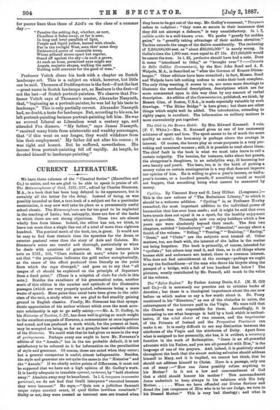CURRENT LITERATURE.
We have three volumes of the " Classical Series" (Macmillan and Co.) to notice, and we are glad to be able to speak in prairie of all. The Metamorphoses of Ovid, 3111.-XIV., edited by Charles Simmons, MA., is a book that has been long delayed in its appearance, but is certainly all the better for the delay. Instead of being, as was possibly intended at first, a text-book of a subject set for a particular examination, it may now well take its place as a permanently useful school classic. The Metamorphoses are far too good to be neglected in the teaching of Latin; but, unhappily, there are few of the books to which there aro not strong objections. These two are almost wholly free from blame. Indeed, the editor has net, we think, to leave out more than a single line out of a total of more than eighteen hundred. The poetical merit of the book, too, is great. It would not be easy to find finer rhetoric than the speeches for the Arms, or sweeter pastoral verse than the story of Acis and Galatea. Mr. Simmona's notes are careful and thorough, particularly so when be deals with questions of grammar. We may instance his note on XIII., 105, " Claro radiantis ab auro," where he points out that "the preposition indicates the gold rather metaphorically, as the cause of the effect produced than literally as the point from which the rays diverged," and goes on to nay that "all usages of ab should be explained on the principle of departure from a fixed point." (There is a misprint of dads for elude in this note.) Besides the excellence of his grammatical notes, another merit of this edition is the number and aptitude of the illustrative passages (which are very properly quoted, references being a mere waste of space). More pains than usual have been given to the criti- cism of the text, a study which we are glad to find steadily gaining ground in English classics. Finally, Mr. Simmons has that sympa- thetic appreciation of his author without which even the most accu- rate scholarship is apt to go sadly aatray.—Mr. A. D. Godley, in
his Histories of Tacitus, has done well in giving so mach weight to the excellent exegesis of Heraens, a commentator at once ingenious and sound, and has produced a work which, for the present at least, may be accepted as being, so far as it goss,the best available edition of the Histories. We could wish that he had given us more in the way of prolegomena. Perham; every one ought to have Mr. Fnrneaux's edition of the " Annals e' but in the too probable default, it is not satisfactory to be referred to it for information on the peculiarities of style and grammar. Of course, these are noted when they occur; bet a general conspectus is useful, almost indispensable. Besides, the style and grammar are not quite the same in the " Histories" and the "Annals." If we chiefly notice points of differences, it must not be supposed that we have not a high opinion of Mr. Godley's work. It is hardly adequate to translate agerent, verterent, by "held absolute sway." Absolute sway may be beneficent. In i. 6, tanquam innocentes perierant, we do not find that Orelli interprets "executed because they were innocent." He says,—" Quin non a judicibus damnati marine culpos convicti erant, id (pod Galbae invidiam concitavit." Guilty or not, they were treated as innocent men are treated when
they have to be got out of the way. Mr. Godley's comment, " Tanquans refers to indefensi "they were so secure in their innocence that they did not attempt a defence," is very unsatisfactory. In i. 7, subitis avidce is a well-known crux. We prefer " greedy for sudden gains," to "greedily taking advantage of their sudden elevation." Tacitus extends the usage of the dative considerably. The reckoning of 2,200,000,000 Best. as "about £20,000,000" is surely wrong. In Galba's time the 1,000 seat. were equal to £7 15s. £17,000,000 would be nearer the sum. In i. 25, perductos should have had a note. Does it mean "introduced to Otho," or "brought over " P—Ocesaris de Bello Gallico Commentarii, by the Rev. John Bond and A. B. Walpole, M.A., is described as "after the German of Kraner.Ditten- berger." Other editions have been consulted ; in fact, Messrs. Bond and Walpole have left nothing undone to make their book complete. The only thing wanting, it seems to us, are some more drawings to illustrate the mechanical descriptions, descriptions which are far more commented upon in this way than by any amount of verbal description. An edition of the Commentaries, published, we think, by Messrs. Ginn, of Boston, U.S.A., is made especially valuable by each drawings. "The Rhine Bridge" ie here given; but there are other things which might well be added. The introduction, extending to eighty pages, is excellent. The information on military matters is most conveniently put together.


































 Previous page
Previous page